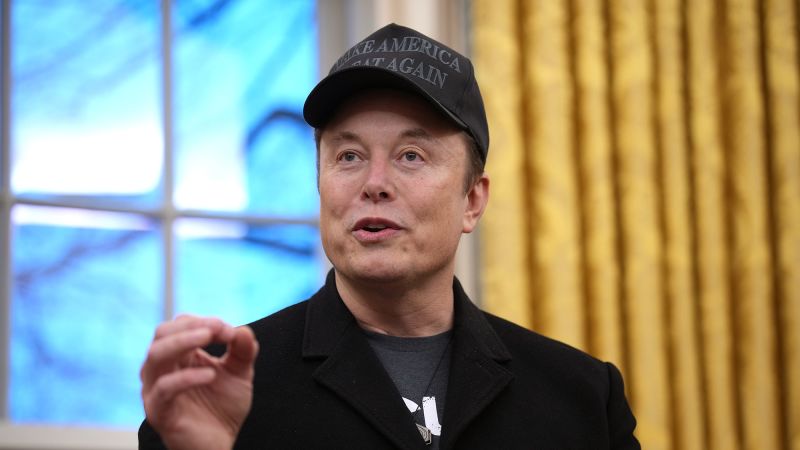Last week, The Washington Post reported that Donald Trump was about to announce a reorganization of the U.S. Postal Service by executive order, firing the Postal Board of Governors and moving the quasi-independent agency under the Commerce Department. Liberals were outraged, and some were miffed that Joe Biden couldn’t even fire Postmaster General Louis DeJoy. But everyone drove past one fact: The very idea is ridiculous.
In his previous discussions of USPS, Trump had talked about privatizing it, not bringing it further into the federal government. Only Congress, though, can actually reorganize an agency that it established through statute. Unlike USAID, the impact of shaking up USPS would be immediately felt by every American with a mailbox, a group that gives the Postal Service the second-highest approval ratings of any federal agency. And then, there’s this little point: By law, the Postal Service is generally exempt from executive orders.
The White House walked back the story almost immediately, saying there was no executive order in the works. When Trump was asked about it, he went into his usual mode of bullshitting on something where he has no real plan: he was “thinking about doing that” and “looking at it.”
More from David Dayen
This is an administration that has set a standard of constant consolidation of power and punishment of enemies. A month in, the Postal Service trial balloon and quick cleanup shows it has run out of ideas. But the real question about Trump’s second term was always whether he would bully the country into an effective monarchy, or fall prey to the laws of political gravity.
I’m taking a pundit risk by saying that we now have that answer, after one month in office: Trump’s cooked.
His failure has followed the usual direction of political overreach. Brave dissidents from the political opposition, corporate America, or his own coalition didn’t suddenly rise to the challenge. It started from the bottom up, as the governed gradually but definitively withdrew their consent, giving space for those we somehow call “leaders” to distance themselves.
This doesn’t mean that the subsequent three years and eleven months will be a garden of earthly delights. Terrible things are going to happen. Good people will be persecuted and bad people elevated pretty much every day for the next 1,400 or so. But when Trump disgracefully walks out of Washington in 2029, I’m far more inclined to believe that we will have a government to return to.
THE THING ABOUT POPULISM IS you have to be popular. The moment you lose touch with the public mood, you lose the ability to set your agenda without friction. I wrote on Valentine’s Day about the big warning sign in consumer sentiment, the unanchored inflation expectations that keep resetting higher. Trump has set himself up as the only person in the government who matters, so every national problem falls on his head. Since he’s done nothing to address those inflation concerns, voters are already starting to assign blame.
Four polls showed measurable drops in his approval rating in the last week, putting him in the lowest position for a president one month after an inauguration since … Donald Trump, in 2017. A Reuters poll found the percentage of the public thinking the country’s on the wrong track rose ten points in a month, and only 32 percent approved of Trump on inflation. His economic approval ratings are lower than at any point in his first term.
When every headline out of Washington is about Elon Musk (who is also increasingly unpopular) firing workers and dismantling agencies and going after DEI programs and taking over IT systems for obscure reasons, it’s no wonder people see the president as focused on the wrong issues. Americans believe Trump has overstepped his authority, but if they were seeing lower prices as a result they probably wouldn’t care, sadly. The disconnect matters more than the lawlessness.
When every headline out of Washington is about Elon Musk, it’s no wonder people see the president as focused on the wrong issues.
But as the economy drifts toward a combination of higher unemployment and higher inflation last seen in the presidency of the late Jimmy Carter, Trump will find it harder to simply sweep in and take power. A town hall held by Rep. Rich McCormick (R-GA) last week, in a district that went for Trump 60-38, was a disaster, with angry constituents demanding that he stand up for them and not let Trump control the federal budget and cut services for the needy. Other deep-red districts have seen similar dynamics. In rural eastern Oregon, at a town hall held by Rep. Cliff Bentz (R-OR) in a county that went 68 percent for Trump, the crowd shouted, “Tax Elon,” “Tax the wealthy,” “Tax the rich,” and “Tax the billionaires.” In Oklahoma, constituents demanded that Rep. Kevin Hern (R-OK), who won in November 60-34, put Musk under oath. In Wisconsin, Rep. Glenn Grothman (R-WI) won by a similar number; at a town hall near Oshkosh, he faced a parade of boos and shouts, as did fellow Wisconsinite Rep. Scott Fitzgerald (R-WI).
For weeks, we’ve seen Republicans effectively falling mute at the actions of the president. All it took was a drop in polling support and some angry town halls to flip that. Here’s Rep. Troy Balderson (R-OH) calling Trump’s executive orders “out of control” and stating that Congress must decide whether federal agencies live or die. His district went Trump, 66-33. Here’s freshman Rep. Rob Bresnahan (R-PA) saying he’ll never take away the benefits his neighbors rely on, including Medicaid. Here’s Rep. Mike Simpson of Idaho, of all places, opposing the mass firing that hit the National Park Service rather hard.
Sen. Thom Tillis (R-NC) spoke publicly on the Senate floor and was among several Republicans taking shots at Trump’s claims about Ukraine being the aggressor in its war with Russia. That kind of public repudiation is new and entirely due to Trump’s collapsing favorability. Sen. Susan Collins (R-ME) furrowing her brow and expressing concern is a perennial, but saying that Trump violated the Constitution by engaging in impoundment is something new for her. Even Sen. Rand Paul (R-KY) had to grudgingly admit that it was up to Congress to sanction all the DOGE spending cuts, even if he liked what they were doing.
All that is on top of the usual tensions within the executive branch hierarchies, particularly with respect to Musk, who is angering cabinet officials and Trump’s inner circle. Republican lawmakers are focusing on Musk too, which would make it easier for Trump to respond to a turn in fortunes by jettisoning him. But Trump’s the one who made all the promises about improving voters’ lives, and he would never fire himself.
The biggest example of the change in mood in the country may be happening at Paramount (which owns CBS). It looked almost certain a month ago that the studio would follow what Disney, Facebook, and X have done by settling frivolous lawsuits with Trump. Paramount’s is about a 60 Minutes interview with Kamala Harris that Trump absurdly claims was deceptively edited to try to cost him the election. The studio is finalizing a sale to Skydance and needs federal approval, which was thought to be the reason it would settle as a gift to the president. But that settlement appears far away now, and Paramount has fought back, including by pursuing a trial where it could obtain Trump’s personal financial information in discovery. That does not happen if Trump is riding high among the public; a diminished figure is easier to rebuke.
None of this will get federal regulators to enforce white-collar crime again. We’re in for an orgy of deregulation, and the tax cut fight still will likely work out well for billionaires, with at least some vulnerable folks paying the price. And in foreign policy, presidents have more of a free hand. Saying that Trump’s coup failed doesn’t change this decidedly dim outlook.
But it does mean that Trump’s seizing the structures of democracy and forcing the political system to carry out his whims is not going to proceed the way it did in the first few weeks of his term. We’re in for trench warfare in the courts on these executive power issues, and Trump will lose many if not most of them. He’ll bob and weave, just as his team is now doing, using loopholes and sleight of hand to keep spending cuts or whatever else he wants. That’s just going to make the public and his political foes angrier. And he needs public acceptance to pull off his radical aims.
This is also not a call to stand down, to relax, to be less vigilant. It’s merely an observation: Public outcry has succeeded. It’s made it impossible for Trump to sustain his coup. If the people keep this up, they will succeed even more.












